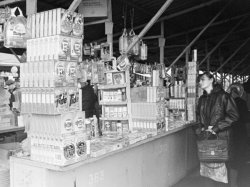REVENGE THE UKRAINIAN WAY OR WHAT DOES DERZHSTANDART BLAME PROCTER & GAMBLE FOR

A huge conflict with international consequences arose between the Ukrainian State Committee on Standardization, Certification, and Metrology (Derzhstandart) and Procter & Gamble Ukraine, which represents the worldwide company in Ukraine.
Company general manager Keser Sharif did not want to and even refused to address the Kuchma-Gore commission representing American companies on how to improve the certification system in Ukraine. These measures were worked out jointly with other companies, but the person who was to give a speech, had to leave Ukraine just before the event. Who knows whether another US company would have face a similar imperative today.
Procter and Gamble has spent much time working on the Ukrainian market. However, it is not enjoying its best time right now. A month ago the State Standard Committee canceled all certification of its products imported into Ukraine, such as for instance the detergents, Tide and Ariel, as well as the shampoos, Head & Shoulders and Pantene along with other products, which are in great demand here. The company should have suffered considerable losses. However, it was Ukraine which actually suffered. The import and trade of the company’s products is suspended and therefore the state is losing revenues it would otherwise have received. This means the State Standard Committee actually caused harm to Ukraine and not the company.
Commenting on the reasons for certificates’ cancellation, Sharif granted The Day an opportunity to read the official documentation, which showed that the State Standard Committee simply went to extremes while trying to protect the domestic manufacturer by creating obstacles for its competitors.
The official reason of canceling Procter & Gamble certification was a delay in organizing inspections at the enterprises, which manufacture products for all European countries, including Ukraine.
Sharif reported that preliminary work on the factories’ certification was launched in June 1997, when the corresponding contract was signed with Ukrsertkhim, the Ukrainian center for certification testing. The work was scheduled to start in September 1997 and end in April 1998. At the same time, Ukrsertkhim supplied Procter with original copies of the certification documents and planned to complete this work within 30 days. Later they intended to launch certification processes at the enterprises.
According to the contract, Ukrsertkhim received Hr 250,000 in payment. But the work took 90 days instead of the scheduled 30, and the certification process was postponed. It is also strange that Mr. Kurko, director of the certification center, began to make strange announcements regarding Procter & Gamble product quality precisely then. Procter turned to the State Committee and during two months (September and October) they negotiated on possible cooperation with an other certification organ. Derzhstandart was supposed to make its official decision.
On December 11 director of a certification center in Vinnytsia visited Sharif and announced that his center was assigned to work with Procter. Official confirmation was expected soon. However, it was not submitted during December and January. Nevertheless, the plan for visiting the first enterprise scheduled for certification was worked out in late January. The experts’ trip to the factory was canceled two days before they had to leave, because no certification center was assigned to work with Procter.
On February 4 the US embassy reported to Sharif, that Derzhstandart leaders wanted to meet with him. And that was when Procter was for the first time accused of starting the certification process too early. P&G was told to work with Ukrsertkhim again. At the end of the meeting Sharif was advised to submit a note of explanation, which he did on February 6. At that time the certification process could still have been launched and completed on time. However, Procter was told that the delay was too long and that there was nothing that could be done about it. As a result, Procter certificates were canceled by an order issued on March 3.
Unofficial accusations of Procter low quality were also discussed during negotiations with Sharif. He replied that the accusations were groundless, for an independent laboratory had tested P&G products and certified their high quality and safety.
Nonetheless, the attacks on Procter continued. The independent experts said the campaign against Procter was launched either because of Sharif’s scheduled speech at the session of Kuchma-Gore commission or was really meant to protect domestic manufacturers.
Then attack came from another direction as Derzhstandart set against P&G the director of the Zaporizhzhia consumer testing center, Lina Popova, who accused Procter of violating the rules of putting electronic markers on the products and of disrespect for Ukrainian consumers. Derzhstandart Chairperson Tetiana Kyseliova, who declared that Procter had confessed that Ukrainian and Western Europe laundry detergents have different formulas, supported her. Sharif denies this.
The most important thing Procter consumers should know is that “the company does not have any problems in receiving certification for its products,” reported Derzhstandart first deputy chairman Yuri Ruban, putting in his nickel’s worth. According to him, the company longs to find an excuse at the political level and now is seeking help in the Chamber of Independent Experts on problems of foreign investment, although in his view the issue is not one of foreign investment because P&G Ukraine in a subject for investments on the territory of Ukraine (What?).
I make no comment beyond that. I only hope the Chamber passes the right decision.
Photo by Leonid Bakka, The Day:
P&G products are sold throughout Ukraine and consumers granted them all certification without delay






